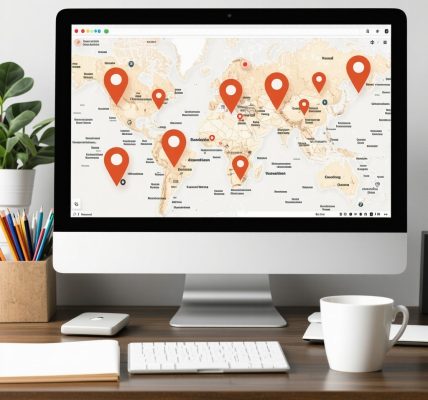Unlocking the Power of GMB Citations: A Strategic Local SEO Lever
Managing Google My Business (GMB) citations is a subtle art that can significantly elevate your local SEO performance. While many business owners focus on reviews or keywords, the meticulous management of citations—the mentions of your business’s name, address, and phone number (NAP) across online directories—remains a foundational pillar for local search success. This article dives deep into advanced strategies that go beyond the basics, empowering you to harness citation management for enhanced visibility and authority in your local market.
Precision in NAP Consistency: The Cornerstone of Citation Authority
Inconsistent NAP data across listings can confuse search engines and dilute your local SEO effectiveness. A single variation in your business name or address—such as “St.” versus “Street”—can fragment your citation profile, weakening Google’s confidence in your location data. To illustrate, a local bakery that updated its address but failed to synchronize this change on niche directories experienced a noticeable drop in local rankings. Regular audits using tools like Moz Local or BrightLocal can help identify inconsistencies before they undermine your SEO efforts.
Elevate Your Citation Quality: Prioritizing Relevance Over Quantity
While quantity once trumped quality in citation building, the landscape has shifted. Search engines now value citations from authoritative, industry-relevant directories more heavily. For example, a boutique law firm gains more from citations on legal directories like Avvo and FindLaw than from generic listing sites. This targeted approach not only enhances your backlink profile but also drives more qualified traffic. Avoid spammy or low-authority sites that could harm your online reputation and rankings.
How Do Correct Citation Management Practices Impact Google’s Local Pack Rankings?
Google’s Local Pack—the coveted trio of local business listings appearing atop search results—is influenced strongly by citation accuracy and consistency. Correct citation management signals to Google that your business is legitimate, stable, and trustworthy, key factors in Local Pack placement. According to Moz’s Local Search Ranking Factors survey, citation signals rank among the top determinants for local search visibility. Businesses with clean, authoritative citations often experience faster inclusion in the Local Pack, translating to higher foot traffic and calls.
Leverage Structured Data and Citation Monitoring for Long-Term Gains
Integrating structured data markup (Schema.org) on your website complements citation efforts by explicitly telling search engines your business details in a standardized format, reducing ambiguity. Coupled with automated citation monitoring, this ensures ongoing accuracy and alerts you to unauthorized changes or duplicates. For instance, a local gym using structured data alongside monthly citation audits maintained top spots consistently over a year despite increased competition.
For more advanced tactics on citation management and local SEO growth, explore our expert guide on mastering Google Maps SEO techniques to dominate local visibility.
Ready to elevate your local SEO through expert GMB citation management? Contact our specialists today and start optimizing your citations for measurable results!
Authoritative insights on local SEO citation importance are extensively documented by Moz in their Local Search Ranking Factors study, an invaluable resource for businesses aiming to refine their local search strategies.
When Citation Management Gets Tricky: Learning from Real-World Mishaps
Managing GMB citations isn’t always straightforward. I’ve personally encountered scenarios where despite regular updates and audits, outdated or duplicate citations lingered on less-known directories. One instance that stands out was when an old franchise location’s listing remained active on a regional directory, siphoning valuable traffic away from the current store. It took persistent outreach and a detailed cleanup plan to get that resolved. This experience taught me that patience and perseverance are key because even minor citation errors can subtly erode your local SEO strength over time.
Harnessing Technology: Tools That Simplify Citation Monitoring and Cleanup
In my journey, leveraging the right tools has been a game changer. Platforms like Moz Local, BrightLocal, and Whitespark are indispensable allies in tracking citation health, detecting duplicates, and automating update requests. These tools empower you to maintain NAP consistency effortlessly and keep tabs on new citations appearing without your knowledge. For example, BrightLocal’s dashboard offers an intuitive overview that helped me quickly identify and fix a batch of incorrect citations that were hurting a client’s rankings.
If you’re curious about specific step-by-step methods to keep your citations pristine, I highly recommend checking out our GMB SEO audit guide. It breaks down practical auditing techniques that anyone can apply, whether you’re a small business owner or a local SEO specialist.
How Can Small Businesses Balance Citation Quality and Quantity Without Getting Overwhelmed?
This question is one I’ve wrestled with often. While it’s tempting to list your business everywhere, I’ve found that focusing on a curated set of high-authority, industry-relevant directories yields the best ROI. Early on, I tried blanket citation submissions which only diluted efforts and created maintenance headaches. Instead, prioritizing quality citations combined with vigilant monitoring strikes the right balance. This approach aligns with recommendations from SEO experts like Moz, who emphasize citation relevance over sheer volume.1
Integrating Citation Strategies with Broader GMB Optimization Efforts
From my perspective, citation management can’t stand alone. It’s most effective when integrated with ongoing Google Business Profile optimization — including crafting compelling descriptions, leveraging targeted keywords, and engaging customers through reviews and posts. For those interested, our comprehensive guide on optimizing your Google Business Listing dives into these tactics with actionable advice to boost your local SEO game holistically.
In the end, the power of citations is amplified when they work in concert with other local SEO strategies, creating a strong, trustworthy presence that Google loves to showcase.
Have you faced challenges or successes with GMB citation management? Share your stories or questions below — I’d love to hear your experiences and insights!
Decoding Complex Citation Conflicts: Expert Techniques for Resolution and Prevention
One of the most perplexing challenges in GMB citation management arises when conflicting information persists despite thorough audits and updates. Often, these conflicts stem from legacy data held by third-party aggregators or less-transparent local directories that feed outdated details into Google’s ecosystem. Addressing these conflicts requires a multi-pronged approach beyond simple correction requests. For instance, engaging directly with data aggregators such as Factual and Neustar Localeze to update or remove erroneous listings can have a profound ripple effect across numerous platforms.
Moreover, instituting a proactive citation governance framework—wherein you track not only primary citations but also secondary and tertiary references—helps preempt discrepancies. This framework involves maintaining an internal citation registry, monitoring citation velocity changes, and establishing scheduled audits aligned with major business updates. These advanced practices transform citation management from reactive cleanups to strategic, ongoing control of your local SEO footprint.
What Are the Best Practices for Handling Persistent Duplicate Citations That Evade Standard Cleanup Methods?
Persistent duplicate citations often result from automated data scraping and syndication loops that propagate identical listings across multiple platforms. The first step is comprehensive identification using advanced tools like Whitespark’s Citation Finder combined with manual verification to pinpoint subtle variations. Subsequently, direct outreach to site owners or leveraging Google’s MapMaker feedback mechanisms can accelerate removal requests. In cases where duplicates impact rankings significantly, legal measures or trademark infringement notices might be warranted for unauthorized listing removals.
Crucially, documenting the duplicate removal process and establishing a continuous monitoring protocol ensures that new duplicates do not reemerge unnoticed, safeguarding the integrity of your business’s local search profile over time.
Harnessing AI and Machine Learning: The Future of Citation Management Automation
Emerging AI-driven platforms are revolutionizing citation management by providing predictive analytics and intelligent anomaly detection. These systems analyze historical citation data trends and flag unusual shifts such as sudden NAP inconsistencies or new, unverified listings that could signal data poisoning or competitor sabotage. Integrating these tools into your citation strategy not only enhances accuracy but also frees valuable human resources for strategic decision-making.
For example, AI-powered dashboards can recommend the optimal mix of citation sources tailored to your industry and geography, dynamically adjusting as local search algorithms evolve. This granular, data-driven approach transcends traditional one-size-fits-all tactics, offering bespoke solutions that maximize citation authority and local relevance.
Strategic Citation Building in Niche Markets: Tailoring Approaches for Maximum Impact
In specialized industries or hyper-local markets, generic citation sources often yield diminishing returns. Instead, tapping into niche-specific directories, local chambers of commerce listings, and industry associations can amplify relevancy signals to Google. For example, a boutique vineyard might benefit more from citations on regional wine consortium websites and gourmet food directories than from broad business listings.
Crafting a citation acquisition strategy that aligns with your unique market position involves deep research into local ecosystem players and leveraging partnerships that naturally generate authoritative mentions. This strategy also includes monitoring competitor citation profiles to uncover overlooked citation opportunities and potential gaps.
By focusing on quality, contextual relevance, and strategic partnerships, niche businesses can build a citation network that not only boosts rankings but also drives highly targeted traffic and conversions.
For those committed to mastering these advanced citation techniques, I invite you to explore our in-depth Advanced Citation Management Strategies Guide, packed with case studies, tool recommendations, and hands-on workflows tailored for sophisticated local SEO practitioners.
Are you ready to take your GMB citation management to the next level with cutting-edge insights and expert support? Connect with our local SEO specialists today and transform your local search presence with precision and confidence!
Authoritative research underpinning these advanced practices can be found in the 2023 Local SEO Impact Report by BrightLocal, providing empirical data on citation influence and emerging trends in local search optimization.2
Mastering the Maze of Citation Conflicts: Proactive Resolutions for Persistent Challenges
Despite rigorous citation audits, conflicting or duplicate business listings can stubbornly persist, undermining your local SEO efforts. The root causes often lie in legacy data held by third-party aggregators and syndicated directories that continue to propagate outdated information. Addressing these issues requires engaging directly with data providers such as Factual and Neustar Localeze, which serve as primary data sources for numerous platforms. By coordinating corrections at this aggregator level, you can initiate a cascading update that rectifies discrepancies across the broader ecosystem.
Implementing a citation governance framework is pivotal. This involves maintaining an internal registry of all citations—including primary, secondary, and tertiary references—monitoring citation velocity, and scheduling systematic audits aligned with business updates. Such a strategy evolves citation management from reactive fixes to strategic foresight, ensuring ongoing data integrity and robust local search presence.
What Are the Best Practices for Handling Persistent Duplicate Citations That Evade Standard Cleanup Methods?
Persistent duplicates often stem from automated data scraping and syndication loops that replicate identical listings across diverse platforms. To combat these, advanced solutions combine comprehensive identification tools like Whitespark’s Citation Finder with meticulous manual verification to capture subtle listing variations. Engaging directly with site owners or utilizing Google’s feedback mechanisms can expedite removal requests. In extreme cases, legal avenues, including trademark infringement notices, may be necessary to eliminate unauthorized listings.
Documentation of each removal effort and establishing a continuous monitoring system are indispensable to prevent recurrence, safeguarding your business’s citation profile against erosion over time.
AI and Machine Learning: Pioneering the Next Generation of Citation Management Automation
Artificial intelligence and machine learning are revolutionizing citation management by delivering predictive analytics and real-time anomaly detection. These advanced platforms analyze historical citation data to identify unusual patterns—such as sudden NAP inconsistencies or emergence of unverified listings—that may indicate data corruption or competitive sabotage.
AI-driven dashboards offer tailored recommendations on optimal citation sources based on industry and geography, dynamically adapting to evolving local search algorithms. This bespoke, data-driven approach surpasses traditional blanket tactics, enabling businesses to amplify citation authority and local relevance with surgical precision.
Tailoring Citation Strategies for Niche Markets: Unlocking Specialized Local SEO Advantages
Generic citation sources often deliver diminishing returns in specialized or hyper-local markets. Instead, harnessing niche-specific directories, local chambers of commerce, industry associations, and strategic partnerships cultivates highly relevant citation signals that resonate more profoundly with search engines.
For instance, a boutique vineyard might prioritize citations on regional wine consortium websites and gourmet food platforms over broad business directories. This targeted approach not only enhances rankings but also drives qualified traffic and conversions. Competitive citation profiling reveals overlooked opportunities and gaps, informing a bespoke acquisition strategy that leverages contextual relevance and authoritative mentions.
For an exhaustive exploration of these advanced citation techniques, including case studies and actionable workflows, consider our Advanced Citation Management Strategies Guide, tailored for seasoned local SEO professionals.
Accelerate your citation mastery and unlock the full potential of your local SEO campaigns. Connect with our expert local SEO team today to implement cutting-edge citation strategies that drive measurable growth and sustainable competitive advantage!
Authoritative data supporting these advanced methodologies can be found in the 2023 Local SEO Impact Report by BrightLocal, offering empirical insights into citation influence and emerging local search trends.
Frequently Asked Questions (FAQ)
What exactly are GMB citations, and why do they matter for local SEO?
GMB citations are online mentions of your business’s name, address, and phone number (NAP) across various directories, websites, and platforms. They serve as foundational trust signals to Google and other search engines, confirming your business’s legitimacy and location. Consistent, accurate citations improve your visibility in local search results and enhance your chances of appearing in Google’s Local Pack.
How can I ensure NAP consistency across all my citations?
Begin by auditing all existing listings using tools like Moz Local, BrightLocal, or Whitespark. Standardize your business name, address, and phone number format, paying close attention to abbreviations and punctuation. Create a master citation document to maintain uniformity and regularly monitor for discrepancies or unauthorized changes. Incorporating structured data markup on your website also helps reinforce accuracy to search engines.
Is it better to have many citations or just a few high-quality ones?
Quality outweighs quantity in modern citation strategies. Focus on authoritative, industry-relevant directories and niche-specific platforms rather than indiscriminately submitting to numerous low-value sites. High-quality citations from trusted sources enhance your backlink profile, drive qualified traffic, and contribute more effectively to local SEO than sheer volume.
What are the best practices for resolving conflicting or duplicate citations?
Identify duplicates comprehensively using citation tracking tools combined with manual checks. Reach out directly to site owners or use Google’s feedback tools to request removal or correction. For persistent duplicates, engage with primary data aggregators like Factual and Neustar Localeze, as updates there propagate widely. Document all efforts and establish ongoing monitoring to prevent recurrence.
How can AI and machine learning improve citation management?
AI-powered platforms offer predictive analytics to detect anomalies such as sudden NAP inconsistencies or unauthorized listings. These tools provide dynamic recommendations tailored to your industry and location, automating monitoring and optimizing citation acquisition strategies. This reduces manual workload and enhances accuracy, enabling proactive and data-driven local SEO management.
Should small businesses invest in niche-specific citations?
Absolutely. Niche-specific directories and local associations provide highly relevant citations that resonate more profoundly with search engines and your target audience. Tailoring your citation strategy to your industry and community often yields better rankings and more qualified leads than generic listings.
How does citation management integrate with other GMB optimization efforts?
Citation management is one pillar of a comprehensive local SEO strategy. When combined with optimized Google Business Profile elements—such as keyword-rich descriptions, engaging posts, and active review management—it creates a robust, authoritative online presence that maximizes local search visibility and customer engagement.
What challenges should I anticipate in citation management?
Persistent outdated or duplicate listings, discrepancies from third-party data aggregators, and unauthorized changes pose ongoing challenges. These require patience, strategic outreach, and sometimes legal measures. A proactive citation governance framework and regular audits help mitigate risks and maintain data integrity over time.
How often should I audit and update my citations?
Regular audits—at least quarterly or aligned with major business updates—are recommended. Frequent monitoring detects inaccuracies early, allowing timely corrections that prevent ranking drops or customer confusion. Employing automated tools enhances efficiency in this ongoing process.
Where can I learn advanced citation management techniques?
Specialized guides like our Advanced Citation Management Strategies Guide provide deep dives into case studies, tools, and workflows designed for seasoned local SEO practitioners seeking to master citation optimization.
Trusted External Sources
- Moz Local Search Ranking Factors Study: A comprehensive, annually updated survey analyzing the impact of citations and other local SEO signals on search rankings, offering empirically grounded insights and industry benchmarks.
- BrightLocal 2023 Local SEO Impact Report: Delivers empirical data on citation influence, emerging trends, and best practices in local search optimization, vital for evidence-based strategy development.
- Google’s Schema.org Structured Data Guidelines: Official documentation on implementing structured data markup to enhance local business information clarity and search engine understanding.
- Neustar Localeze and Factual Data Aggregators: Key primary data providers feeding local business information to multiple platforms, crucial for managing citation accuracy at the source level.
- Whitespark Citation Finder Tool: An authoritative tool widely used for citation discovery, audit, and management, enabling precise identification and resolution of citation issues.
Conclusion
Mastering Google My Business citation management is an indispensable strategy for elevating your local SEO footprint. By ensuring meticulous NAP consistency, prioritizing high-quality and industry-relevant citations, and proactively resolving conflicts and duplicates, you build a solid foundation of trust and authority in Google’s eyes. Integrating structured data and leveraging advanced AI-driven tools further amplify these efforts, transforming citation management from a reactive chore into a strategic advantage.
For niche markets and specialized industries, tailoring citation strategies unlocks unique local SEO opportunities, driving highly targeted traffic and conversions. Remember, citation management thrives when harmonized with broader Google Business Profile optimization, creating a comprehensive, credible online presence that attracts and converts local customers.
Empower your business today by applying these expert insights and exploring our in-depth resources. Share your experiences, ask questions, and connect with our local SEO specialists to elevate your citation strategy and dominate your local market with confidence!





I recently started focusing more on citation accuracy and NAP consistency after noticing some fluctuations in local rankings despite good reviews and engaging content. Using tools like Moz Local has really streamlined the process for me, especially in catching those subtle discrepancies like abbreviations or outdated addresses. It’s fascinating how much these seemingly minor details impact local SEO.
From my experience, integrating structured data markup on your website not only clarifies your business info for search engines but also complements citation efforts effectively. Have others found that combining technical SEO elements such as schema markup with citation monitoring leads to more stable rankings over time? It seems like a comprehensive approach that tackles both on-site signals and off-site citations could provide a real boost, especially in competitive local markets.